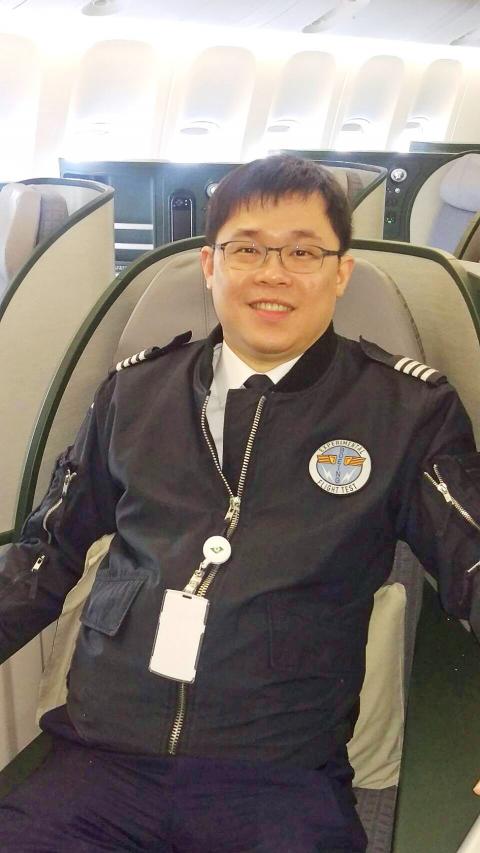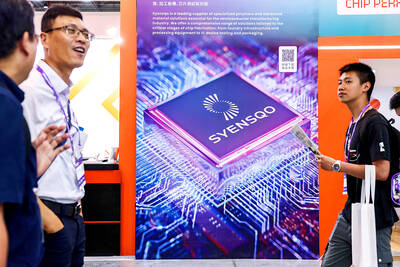Former EVA Air Corp (長榮航空) chairman Chang Kuo-wei (張國煒) yesterday completed his exit from the company as he prepares to reenter the industry with his own carrier, StarLux Airlines (星宇航空).
Although Chang remains a major shareholder in the company with a 11.45 percent stake, after its board of directors election yesterday he has made a clean exit from EVA Air.
With his stake, Chang could have appointed up to two representatives on EVA Air’s board, market commentators have said.

Photo: Wang Yi-hong, Taipei Times
Meanwhile, leadership of the company has been fully secured by Chang Kuo-hua (張國華), Chang Kuo-wei’s elder brother, who has prevailed in the succession battle that followed the death last year of Evergreen Group (長榮集團) founder Chang Yung-fa (張榮發).
EVA Air chairman Steve Lin (林寶水) gave shareholders a cautious outlook on earnings for the second half of this year, saying that the company is expecting to see a recovery in the peak summer season, but prospects are not as favorable as in previous years.
Lin said that the carrier expects to see its load factor increase by 20 percent annually, as efforts from the past two years to improve transfer routes in North America and Southeast Asia begin to take hold.
In addition, the company is to be the first Taiwanese carrier to deploy the new Boeing 787 Dreamliner in the second half of this year, Lin said.
EVA Air president Derek Chen (陳憲弘) said that after the Boeing 787 is operational, the company would adjust its fleet allocations to destinations in Europe, New Zealand and Australia, and expand coverage of regional routes.
In the past decade, New Zealand and Australia have become more sensitive to seasonality, as more tourists are traveling, Chen said.
Lin also gave well-wishes for StarLux Airlines, and said that EVA Air is focused on competing against larger regional carriers and is not threatened by the new venture.
The company posted a net loss of NT$738 million (US$24.33 million) in the first quarter due to rising fuel prices during the period, which surged from about US$40 per barrel a year earlier to US$60, adding pressure to the carrier’s annual usage of about 14.72 million barrels.
The company is also facing labor relations issues as it begins negotiating a request by its employees to form a union, Chen said, adding that more favorable terms for employees are dependent on market conditions.

SEMICONDUCTOR SERVICES: A company executive said that Taiwanese firms must think about how to participate in global supply chains and lift their competitiveness Taiwan Semiconductor Manufacturing Co (TSMC, 台積電) yesterday said it expects to launch its first multifunctional service center in Pingtung County in the middle of 2027, in a bid to foster a resilient high-tech facility construction ecosystem. TSMC broached the idea of creating a center two or three years ago when it started building new manufacturing capacity in the US and Japan, the company said. The center, dubbed an “ecosystem park,” would assist local manufacturing facility construction partners to upgrade their capabilities and secure more deals from other global chipmakers such as Intel Corp, Micron Technology Inc and Infineon Technologies AG, TSMC said. It

People walk past advertising for a Syensqo chip at the Semicon Taiwan exhibition in Taipei yesterday.

NO BREAKTHROUGH? More substantial ‘deliverables,’ such as tariff reductions, would likely be saved for a meeting between Trump and Xi later this year, a trade expert said China launched two probes targeting the US semiconductor sector on Saturday ahead of talks between the two nations in Spain this week on trade, national security and the ownership of social media platform TikTok. China’s Ministry of Commerce announced an anti-dumping investigation into certain analog integrated circuits (ICs) imported from the US. The investigation is to target some commodity interface ICs and gate driver ICs, which are commonly made by US companies such as Texas Instruments Inc and ON Semiconductor Corp. The ministry also announced an anti-discrimination probe into US measures against China’s chip sector. US measures such as export curbs and tariffs

The US on Friday penalized two Chinese firms that acquired US chipmaking equipment for China’s top chipmaker, Semiconductor Manufacturing International Corp (SMIC, 中芯國際), including them among 32 entities that were added to the US Department of Commerce’s restricted trade list, a US government posting showed. Twenty-three of the 32 are in China. GMC Semiconductor Technology (Wuxi) Co (吉姆西半導體科技) and Jicun Semiconductor Technology (Shanghai) Co (吉存半導體科技) were placed on the list, formally known as the Entity List, for acquiring equipment for SMIC Northern Integrated Circuit Manufacturing (Beijing) Corp (中芯北方積體電路) and Semiconductor Manufacturing International (Beijing) Corp (中芯北京), the US Federal Register posting said. The